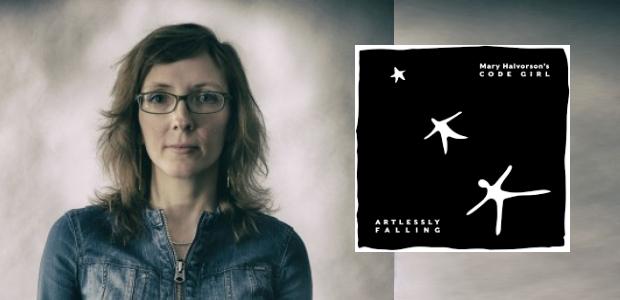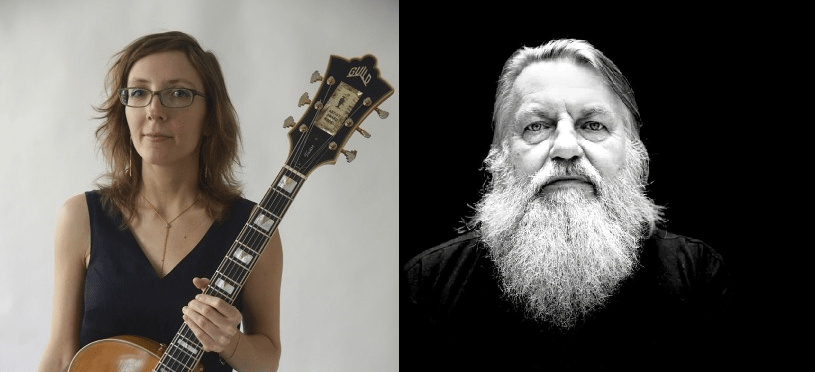Developing a sound is a lifelong goal - interview with Mary Halvorson

Was 2020 a good year for you?
Mary Halvorson: Yes and no. What is there to say about 2020? It was an unprecedented year and there was so much pain and sadness in the world. It was tough, but I tried to make the most of it. On a personal level, being still for a moment was important for me, and I got the chance to really slow down and evaluate things, study and practice my instrument.
How would you describe what happened last year in your musical life? Have you had a time for some new experiences?
MH: For the previous decade plus, I had been on the road constantly. Having the time to be home in Brooklyn for almost a whole year, and to really be able to sit with the guitar and have focused and regular practice time, as well as plenty of time to compose, study and try out new ideas, was invaluable. That aspect of it was a real positive for me. I do think that when the world “starts up” again, whenever that is, I will feel recharged and ready to go.

What did you miss the most? I think maybe it were concerts…
Last year you've published second album of your Code Girl project. What are the main differences between "Code Girl" and "Artlessly Falling"?
MH: There are quite a few differences. For the second record, I added two of my favorite young musicians to the project-- trumpeter Adam O’Farrill and tenor saxophonist/ vocalist María Grand-- and also one of my musical heroes, Robert Wyatt, who sings on three tracks. The lyrical content was different as well: each of the lyrics for Artlessly Falling was penned in a different poetic form, from a Sestina to a Ghazal to a Tanka. It was a really fun challenge to work with the expanded line-up and to get a chance to study poetry in an organized way, and push myself into some new spaces both lyrically and musically.

On the second album we can hear Robert Wyatt voice. How was to work with one of the most original artists in rock music? Have you listened to his milestone albums like "Rock Bottom" or those recorded with Soft Machine?
MH: I have probably listened to Robert’s music more than anyone else’s music over the years. Rock Bottom might even be my favorite record of all time. Getting a chance to work with him, as cliché as it sounds, was a dream come true. Robert is such a unique, deep and thoughtful musician, and to write songs for him to sing was a surreal experience, to say the least. He was wonderful to work with and I’m so grateful he was open to singing on the record.
Your guitar sound is something fresh and original in jazz and improvised music. How did you get your sound?
MH: Developing a sound is a lifelong goal. Since I was probably 18 or 19 I have been pushing myself to try to develop what I do, write my own exercises, come up with ideas to further my concepts for the guitar. At the same time I have always studied various musical traditions, taking influence but making sure to not feel beholden to any one genre.

Anthony Braxon was your teacher. What have you learned from him?
MH: I learned so much from his fearless and completely original approach. Most importantly, that music and creativity are limitless, and there are no rules you have to adhere to. Anthony always told me that if you’re not making mistakes, something’s wrong. You need to be constantly pushing yourself and taking risks, and have the confidence to do what you believe in.
With Tomas Fujiwara and Michael Formanek, with whom you have a band called Thumbscrew, you have recorded last year "The Anthony Braxton Project". What was the idea for this album? Is it a tribute?
MH: Anthony’s Tri-Centric Foundation approached Thumbscrew, along with several other groups, about performing Anthony’s music in celebration of his 75th birthday last year. We were very enthusiastic about the idea, so we visited the Anthony Braxton archives in New Haven and looked through all his scores and chose compositions. We decided to focus mostly on early music of Anthony’s which was either previously unrecorded, or, in the case of two or three compositions, recorded only once. Then, a few months later, Thumbscrew did an artist residency at City of Asylum in Pittsburgh, where we spent about a month working on Anthony’s compositions. It was a very intense, challenging and inspiring time learning from his music and trying to do it justice, while simultaneously working to integrate it into our band sound and concept.

You've worked with many extraordinary musicians. For example last year you've released an album with Susan Alcorn, who plays pedal steel guitar. How was to work with her?
MH: Susan is an absolutely incredible musician and human being. Her approach to the pedal steel and her voice as an improviser are truly unique, and her music has always hit me in a powerful way. It was an amazing experience to be a part of her quintet project. It felt like getting a chance to be inside her head for a moment-- trying to honor the ideas and sounds she was going for. Previously, I’d only worked with her in an improvised situation or in my own octet, so playing her original music was a new and welcomed experience.
What is for you more adventurous: playing with a band or alone like on album "Meltframe"?
MH: One is not more adventurous than the other-- they are just completely different experiences. I will say that playing solo was extremely challenging, both physically and mentally. I tried to think about orchestration quite a lot in the solo context, and get the widest possible array of sounds and ideas out of the electric guitar. I learned a lot doing it, and some of the concepts I worked out solo I was able to bring back into my band projects.

You've a lot of concerts in Poland. Which of them did you like the most?
MH: I don’t have a favorite, but I will say I love performing in Poland. Pretty much across the board, the energy and enthusiasm you get from audiences there is so strong, almost electric. You can tell how much people love music and how knowledgeable and passionate they are about music, and that always makes for a great performance experience.
What are your plans for 2021?
MH: At the moment nothing has really changed from 2020 in terms of my daily routine-- I am continuing to stay at home compose and practice daily. I am writing music for some new projects, and my hope is, as soon as live performance starts up again, I can hit the ground running.
- Aby wysyłać odpowiedzi, należy się zalogować.







